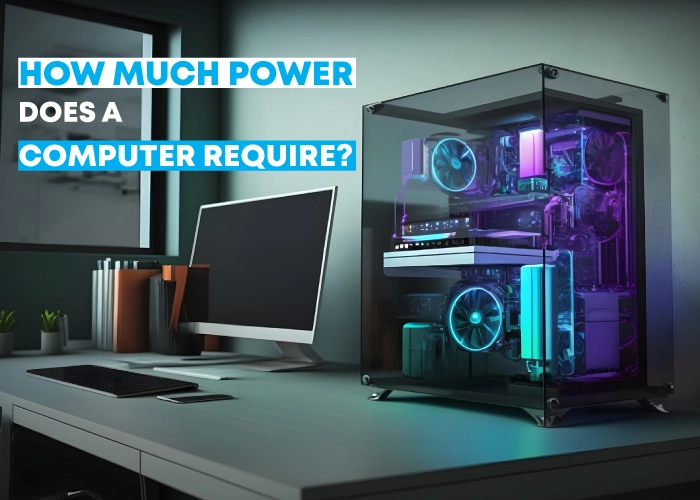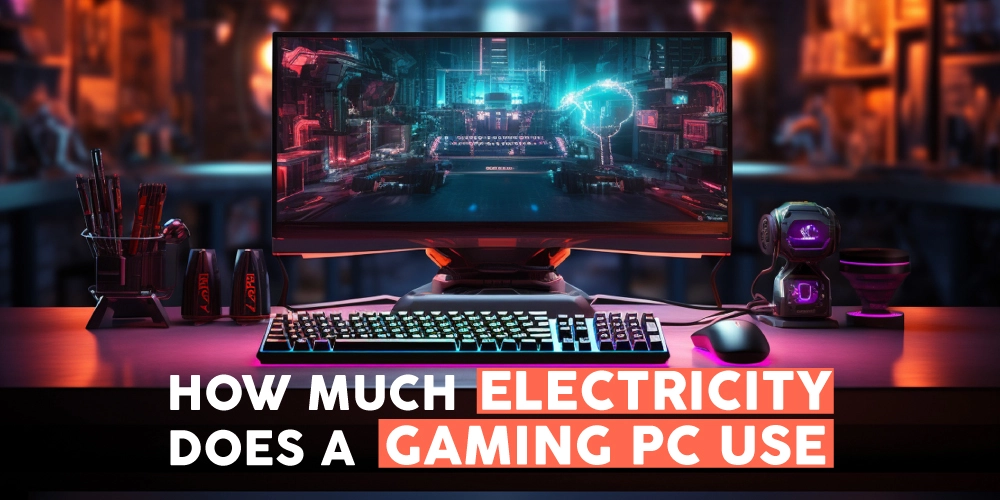Vital components, excellent performance, and the capacity to run the newest games with breathtaking graphics are hallmarks of gaming PCs. However, the cost of this power is the consumption of electricity. You can estimate energy expenditures, optimize your setup, and make more environmentally friendly decisions by knowing how much electricity a gaming PC needs. This blog post will explain the variables that impact a gaming PC’s power use and how to compute it. Let’s talk about how much electricity a gaming PC uses.
What Is a Gaming PC’s Average Electricity Use?
The average monthly and annual cost of a gaming PC has been determined.
According to a 2021 poll by The State of Online Gaming, the typical person spends 8.6 hours a week enjoying video games. That comes to about 1.2 hours a day. That being said, as we both know, you play far more than that. Three hours at the very least (which is probably underestimating your gaming skill). This implies that you are fighting bosses, making your way up to triumph, and talking strategy with your allies for 1095 hours a year.
At the moment, 24.50p/kWh is the average cost of energy. Running your gaming PC may cost up to £11.78 a month if it has an 80 PLUS Gold certified 500W power supply and you play games for three hours a day. This works out to an annual average of £141.36. The supposition behind these computations is that the gaming PC has mid-range hardware. However, you may probably treble this amount if you have a high-performance PC with a 1000W PSU, which will cost you or the parents an incredible £273.42.
The Value of an Energy-Saving Computer
The best approach to contribute to a gaming PC’s cost reduction is to get energy-efficient gear. This will help you use less energy overall, saving you money. It will also help your home use less energy.
Building an energy-efficient PC without sacrificing functionality or using the newest, most advanced hardware. You can still have the same robust performance, clear graphics, lightning-fast speeds, engaging gameplay, and lower electricity costs with an energy-efficient PC!
How much power does a computer require?

Computers typically consume 30 to 70 watts (W) of electricity, depending on the model. Computers usually plug into a 120-volt socket and require three to five amps. Larger desktops and gaming machines can use up to 500 W.
The most significant factor influencing your computer’s electricity consumption is how often you use it. Assuming that a typical computer requires 50 W to operate:
- Six hours a day of computer use adds up to 2.1 kWh of electricity every week, 9.1 kWh per month, and 109.5 kWh annually.
- Using a computer for eight hours a day results in 2.8 kWh per week, 12.2 kWh per month, and 146 kWh annually.
- Ten hours of daily computer use results in 3.5 kWh of electricity consumption per week, 15.2 kWh per month, and 182.5 kWh per year.
Frequently asked queries concerning computer powering.
When is the ideal time for computer use?
If your rate plan is time-of-use (TOU), you will pay varying amounts for electricity at different times of the day. Generally speaking, using appliances overnight or during “off-peak” hours results in lower costs.
What kind of battery is required for a computer backup?
Most lithium-ion batteries, such as the Tesla Powerwall or Generac PWRcell, have a power rating of 4 to 5 kW or more and more than 10 kWh of usable capacity, meaning they can all power a computer. A battery will be more than adequate for powering and storing your computer, even for extended periods and with more powerful computers, as PCs only require around 50 W (0.05 kW) of power at any given time.
What is the number of solar panels required to power a computer?
Computers require roughly 50 W of electricity to operate on average. You should have no trouble using one solar panel to power a laptop, as most solar panels have a 350 W rating.
ENERGY STAR appliances: what are they?

A U.S. government-backed program called ENERGY STAR certifies the energy efficiency of appliances. An appliance outperforms the average in its category by a specific margin to qualify as ENERGY STAR certified. Because ENERGY STAR appliances use less electricity, they are more cost-effective.
What is the daily electricity consumption of a gaming computer?
The electricity consumption of a gaming machine can vary, depending on the kind of components, the games being played, and the length of use. A gaming PC can consume 80 to 150 watt-hours per hour on average. This implies that your gaming PC may use between 320 and 600 watt-hours in 24 hours if you play for four hours daily. However, remember that this is only an estimate, and actual usage may differ significantly based on the gaming PC’s configuration.
How much does it cost to use electricity to power a gaming PC?
If you use your 300-watt gaming PC five hours a day, every day in New York, your monthly electricity bill will increase by $10.35. Another example: in Florida, you will pay an extra $7.20 monthly if you use a 500-watt gaming PC for three hours a day.
Do gaming PCs make you pay more for electricity?
A gaming PC might increase electricity costs, mainly if used frequently or has a sophisticated setup. Strong gaming setups require a lot of electricity, which raises the price of energy. But power isn’t the only factor. It matters also how long and how frequently you play. Playing video games for hours every day? That may cause your monthly expenses to increase significantly. Recognise the energy requirements of your PC to reduce the costs. Choose wisely when and how to use it, and give updates some thought. Appreciate your pocketbook.
In summary
A gaming PC’s power consumption might vary greatly depending on its parts, usage habits, and effectiveness. You may efficiently manage your electricity expenditures and choose a gaming setup by being aware of these elements.

